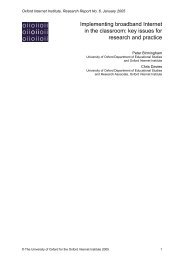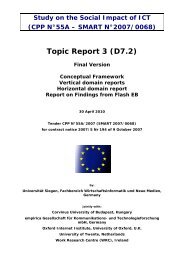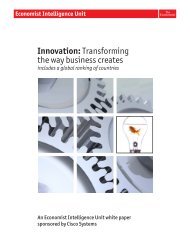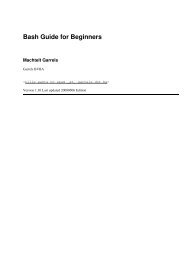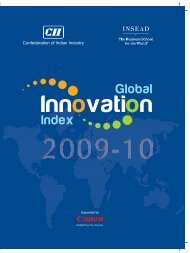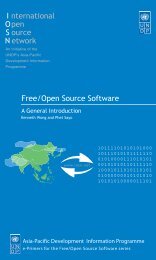Recommendations ❘ 19Analysts and linguists.FOSS programmers.Translators and technical writers.Testers.Trainers.Project management for localization should be split into two jobs: (i) Technical Managers direct the actualediting of code to ensure proper language support; and (ii) Translation Managers coordinate the creativeefforts of linguists, technical writers and trainers.Analysts and linguists work together with project managers, sociologists and programme sponsors toidentify the technical challenges to be overcome and the cultural-linguistic requirements to be met.Their work results in requirement specifications and a project description that the project manager usesto guide the project to completion. This roadmap guides the programmers in their work, and providesthe benchmark against which the software will be tested. The analysts are also responsible for gathering,organizing and disseminating the technical standards and specifications required by the programmersto perform their work.Since both the operating system user interface and various application user interfaces should be localized,often several different types of programmers will be required. Enthusiasts can perform this work remotelywith others worldwide, but only if the problem has been thoroughly documented by the analysts.Wherever possible, local programming staff should be used for this stage of the work. The lessons theylearn, and write down for later reference, can be spread to others who are performing localization. Theymay also create the technical standards for that language if none exists. Compliance with such FOSSstandards as “G11N, I18N, L10N” (please see Glossary) and others, will ensure that work proceeds quicklywith the confidence that successive developers can continue to update and improve the software.Translators and technical writers perform the lion’s share of the work. All the error messages, buttons,menus, commands, help files and user guides must be translated. In consultation with linguists forconsistency and accuracy, translators and technical writers compile technical dictionaries, often coiningnew technical words and phrases that enable future developers to communicate more effectively withtheir colleagues. Just as the technical standards for localization are vital to programmers, the technicaldictionary used by the writers and translators is vital to the project’s success.Testers use the requirement specifications to check the complete work of both the programmers andtechnical writers. Their painstaking work identifies errors and inconsistencies to be corrected, andrechecked, before release to the users of the software. Additional apprentice testers, especially thosewho speak no English and who are computer novices, can provide excellent feedback for programmersand translators.Trainers introduce the localized software to the users. Often, local teachers who have been taught howto use the system give seminars, answer questions and mentor computer enthusiasts. Local businessesand governments may also hire trainers to educate their workforce. It is important to ensure that thesesoftware trainers are locally recruited and speak the native language, rather than being English speakersimported at great expense.For both proprietary and <strong>free</strong> software, training on how the software works is essential. To teach localusers how to operate the software, one needs:Training equipment and materials.Classrooms.Instructors.Most often, developers of the software ‘train the trainer’, who then instructs novices to make themadvanced users. Training can be further divided between user training, system administrator trainingand developer training. Except for user training, which should be widespread, most specialized FOSStraining takes place in educational institutions. Countries that have advanced quickly in FOSS localizationhave all devoted considerable resources to training and education. Without actual adoption of thesoftware by a large segment of the population, the work of localization is an exercise in futility.Tools and equipment for FOSS development and localization are less expensive than those required forproprietary localization. Version control, project management, documentation change management,and development tool kits for programmers are all available either <strong>free</strong> of charge or at a low cost. To
20 ❘ FREE/OPEN SOURCE SOFTWARE: LOCALIZATIONwork on FOSS, experience shows that it is best to use <strong>free</strong>/open source tools.All other equipment, including most development computers, should be up to date, in a secureenvironment. A separate budget should be set aside for libraries, references and language tools specificto the language to be localized. If these materials do not already exist, they must be created.Wherever possible, information on FOSS localization should be shared with the international FOSSdevelopment community so that the necessary tools do not have to be recreated by every team.Costs of FOSS LocalizationTechnically speaking, localizing FOSS costs about as much as localizing commercial software. Only thetechniques of programming are significantly different, since the linguistic and operational challengesexist no matter what type of software is to be localized. To localize any software, the following are needed:Office space.Office equipment and tools.Technical staff.Access to technical information.Access to linguists and translators.The largest cost will be staff salaries. The total cost of a project depends heavily on the wage expectationsof local technical, translation, writing and testing staff, and their individual levels of experience withsoftware localization, language and cultural issues.The programmers and project managers probably require a higher-than-average education and salary,but most of the other staff utilizes skills that are not particular to software and can be found more readilyin the general population.Trainers are hired when the software is near finalization, and presumably remain employed in teachingnew users, system administrators and developers how to use the software.For countries seeking independence from proprietary English language software, a permanent localoffice whose purpose is to train and disseminate technical information about localization could yieldexponential savings. This establishment could be associated with a public library or university, whereinterested parties can access information at little or no cost.FOSS can often operate well on older computers. This offers advantages to both developed countrieswith an overstock of used computers they must dispose of, and developing countries that can configurethese computers to operate FOSS in the local language.The total cost of localizing any particular piece of software is highly variable. Each project requiresindividual analysis for complexity, experience and availability of technical staff, and the characteristics ofthe local language.Software cost and schedule estimating is not a simple calculation. In addition to a rough estimate basedon the number of message strings to be translated, other factors must be considered.Experience: Do the programmers, translators and testers have previous experience with thiskind of work? If not, it will require extra time and effort to train them in the processes andstandards of localization. But translators learn very quickly, and productivity increasesdramatically after the first month or two. With a stable team, the members become veryproductive.Environment: Does the staff have the tools and equipment needed to perform the work in aprofessional manner? Without modern office space, tools and techniques, it is unrealistic toexpect the staff to perform at top efficiency.Linguistic factors: How different is the local language from English? Translating from English toSwedish, for example, is fairly simple. The grammar, length of words and vocabulary is verysimilar. There is near universal fluency in English, and translators are easy to find. On the otherhand, translating from English to Lao is very difficult. The grammar, spelling conventions, wordlength, collation, and other factors are not similar at all. So the size and position of user interface




